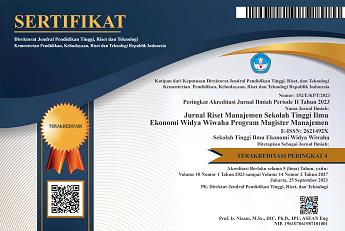PERILAKU TERENCANA KNOWLEDGE SHARING
(STUDI PADA DOSEN KOPERTIS WILAYAH V YOGYAKARTA)
DOI:
https://doi.org/10.32477/jrm.v3i2.69Keywords:
knowledge sharing, lecturer, theory planned behavior (TPB), planned behavior control (PBC)Abstract
University is a collector of knowledge has a role in supporting the concept of knowledge based economy. This study was conducted with subjects research university lecturers in Kopertis Wilayah V Yogyakarta were 300 respondents. The purpose of the study to examine the factors that influence knowledge sharing from the perspective of the theory oh human behavior and the Theory of Planned Behavior developed a research model of knowledge sharing. Using SEM analysis tool to test the research hypothesis. The results of the study with a response rate of 67% stated that the attitude toward knowledge sharing (BH.ATI) affects yhe intention to knowledge sharing (IKS), in addition to the influence of subjective norm (SN) on the intention to knowledge sharing. The test results also suggested taht hypothesis of planned behavior control (PBC) effect on the intention to knowledge sharing (IKS) prove to be significant. The results of the influence of planeed behavior controll (PBC) to the knowledge haring behavior (KSB) is not acceptable (H4 unsupport). In this case it is possible to make a faculty experience less or does not have a positive attitude to knowledge sharing with others. It’s because there is perception that some of the behavior he will gain certain advantages. Statement of intent to knowledge sharing (IKS) affect knowledge sharing behavior (KSB) is acceptable.
References
Bock, Zmud, Kim, and Lee (2005), Behavior intention formation in knowledge sharing: examining the roles of extrinsic motivators, social psychological forces, and organizational climate, MIS Quarterly (29:1).p.87- 111.
Brown and Duguid (1991), Organizational learning and communities of practice toward a unified view of working, Organization Science. Vol.2,No.1.
Cheng, and Chen (2007), A study on the knowledge sharing of health technology for technological college students’ mobile learning, International Journal of Education and Information Technologies (1:1), p.24-29.
Damodaran, and Olphert (2000), Barriers and facilitators to the use of knowledge management systems, Behaviour & Information Technology,19(6), p.405"413.
Davenport, Thomas and Prusak (1998), Working knowledge: how organizations manage what they know. Boston: Harvard Business School Press.
Foss, and Pedersen (2002), Sources of subsidiary knowledge and organizational means of knowledge transfer, Journal of International Management, Vol. 8:p.49-67.
Grant (1996), Toward a knowledge-based theory of the firm, Strategic Management Journal, Vol. 17 (7), p.109-122.
Hinds, Patterson, and Pfeffer (2001), Bothered by abstraction: the effect of expertise on knowledge transfer and subsequent novice performance, Journal of Applied Psychology,Vol.86 , p.1232-1243.
Ajzen (1991), The theory of planned behavior, organizational behavior and human decision processes, Vol. 50, pp. 319-349.
Lin, and Lee (2004), Perceptions of senior managers toward knowledge sharing behaviour, Management Decision, Vol. 42, No. 1,pp. 108-25.
Mc Elroy (2003), The new knowledge management: complexity, learning &sustainable innovation, New York, Knowledge Management Consortium International.
Neuman (2006), Social Research Methods: Qualitative and Quantitative Research. USA: University of Wisconsin, p. 209-309.
Oosterlinck, et al. (2000), Knowledge management in post-secondary education: Universities,OECD Working Paper, Web Eriºimi [12.07.2004]: h t t p : / / www.oecd . o r g / d a taoecd/ 4 6 / 2 1 / 2074921.pdf. Knowledge in post-secondary education:Universities.
Sekaran, Uma (2002), Research Methods For Business: A Skill Building Aproach, 5th Edition, New York: John Wiley & Sons, Inc.
Singarimbun dan Sofian Effendi (1998), Metode Penelitian Survey, Jakarta: PT Pustaka LP3ES Indonesia.
Spender, and Grant (1996), Knowledge and the firm: overview, Strategic Management Journal, 17 (Winter):p. 5-9.
Sugiyono (2007), Metode Penelitian Administrasi, Bandung: Alfabeta.









